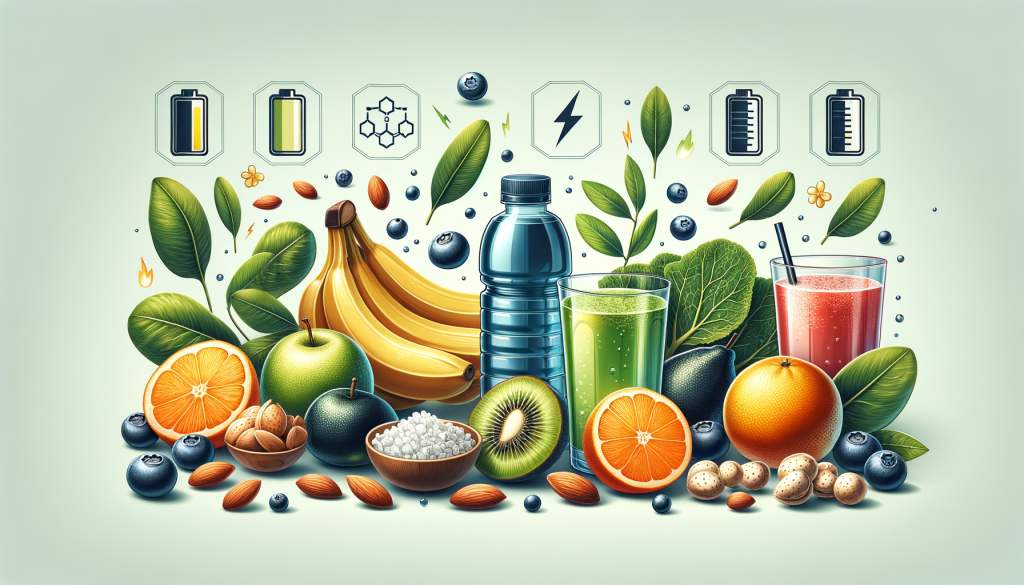
Understanding the role of electrolytes in hydration is essential, as they regulate fluid balance and support muscle and nerve function, needing replenishment after activities like exercise. They include sodium, potassium, calcium, and magnesium. Also, chloride, bicarbonate, and phosphate. All of them carry a charge and help regulate fluid balance. When you drink electrolyte-rich fluids, you’re not just quenching thirst. You’re also supporting muscle and nerve function and pH balance.
Understanding the interplay between hydration and electrolytes is crucial for your overall well-being. Water transports electrolytes in your body. It helps nutrients flow into cells and waste flow out. Sodium and chloride are often found together as table salt. They are important for fluid balance. Proper hydration isn’t just about plain water. It’s about ensuring that the right electrolytes are present. They need to be in the right amounts to distribute and use that water well.
Your daily activities, from exercising to just breathing, use up water and electrolytes. To maintain optimal health, they need replacement. You might be an athlete sweating out minerals during tough workouts. Or, you might be coping with hot weather. It’s crucial to replace lost fluids and electrolytes to avoid dehydration.
Definition of Electrolytes
Electrolytes are minerals with an electric charge when dissolved in bodily fluids. They play critical roles in your body. They regulate nerve and muscle function, hydration, blood pH, and tissue repair.
Types of Electrolytes:
- Cations: Positively charged ions like sodium (Na+), potassium (K+), calcium (Ca2+), and magnesium (Mg2+).
- Anions: Negatively charged ions include chloride (Cl-), phosphate (PO4²-), bicarbonate (HCO3-), and sulfate (SO4²-).
They are essential because they help control water flow in and out of cells and maintain the acid-base balance needed for cells. You absorb nutrients. Your body processes fluids. Your bloodstream sends electrolytes to where they are most needed.
Sources of Electrolytes: Your body obtains electrolytes from the foods you eat and the fluids you drink. Balance is key, as both an excess and a deficiency of electrolytes can disrupt your body’s functionality.
Balancing Act: Your kidneys manage electrolyte levels. But, factors like water intake, diet, and health can affect this balance. Staying hydrated is key. You need a diet with enough electrolytes for your body’s balance.
Importance of Electrolytes in Hydration

When you hydrate your body, it’s not just about drinking water. Electrolytes play a critical role in ensuring that your hydration efforts are effective. Electrolytes include minerals like sodium, potassium, calcium, magnesium, bicarbonate, chloride, and phosphorus. Charged particles are vital in hydration. They help regulate fluid in your cells and body.
Here’s how electrolytes support your hydration:
- Balance Fluids: They help maintain the balance between the fluids inside and outside of your cells.
- Prevent Dehydration: By retaining water, they prevent dehydration and ensure that you rehydrate effectively.
- Conduct Nerve Signals: Electrolytes are also crucial for conducting nerve signals and the proper function of your muscles.
During physical activity, you naturally lose electrolytes through sweat, particularly sodium and potassium. This is why you should drink electrolyte-rich fluids. They are important for rehydration, especially after intense exercise or in hot weather.
The World Health Organization recommends a rehydration solution that contains:
- Water: 32 oz
- Sodium chloride (table salt): 1/2 tsp
- Potassium chloride: 1/4 tsp
- Sodium bicarbonate (baking soda): 1/2 tsp
- Sugar or glucose-based sweetener: 2 tbsp
This mix helps replenish your electrolyte levels and supports proper hydration.
The Role of Electrolytes in the Human Body
Electrolytes are minerals in your body with an electric charge. Your body fluids contain these vital nutrients. They play a crucial role in many key functions. To keep your body working well, you must keep these electrolytes in balance.
Electrolyte Balance and Fluid Balance Your body’s electrolyte balance is tightly linked to fluid balance. Electrolytes, like sodium, potassium, and chloride, create the osmotic pressure. This pressure balances fluid levels between your internal and external cell environments. This is why, after tough exercise, replacing your electrolytes is as important as drinking water.
Muscle Contraction For muscles to contract and relax properly. This requires a precise balance of electrolytes. Calcium and potassium are key. Calcium starts the contraction. Potassium helps muscles relax. An imbalance can lead to cramping or muscle weakness.
Nerve Impulses Just as with muscle contractions, nerve impulse transmission relies on electrolytes. Sodium and potassium levels influence the electrical gradients needed for nerve impulses. With the right balance, your nerves can transmit signals well. These signals are essential for sensing and movement.
Heart Rhythm Your heart’s rhythm depends on electrolytes, especially potassium. Adequate levels keep your heart beating regularly. Any disturbance can lead to irregular heartbeats, known as arrhythmias.
Functions of Electrolytes
Electrolytes are crucial. They help maintain your body’s balance by regulating fluid and conducting the charges needed for processes.

Electrolyte Balance and Fluid Balance
Minerals dissolve in electrolytes. They influence the movement of water in and out of cells. Fluid balance in your body intertwines with them. The main electrolytes are sodium, potassium, and chloride. They help keep your body’s fluid levels steady.
Relationship between Electrolyte Balance and Fluid Balance
Electrolyte balance and fluid balance interact dynamically. Imbalances in electrolytes can disrupt fluid levels. Changes in fluid levels can impact electrolyte concentration. Proper fluid balance is critical. It affects all of your body, from muscles to nutrient delivery.
Importance of Maintaining Proper Balance
Proper electrolyte levels are vital. Many functions need them. They conduct the charges needed for muscle and nerve activity. They also help regulate pH levels. This ensures that your body’s environment stays within a narrow range that’s good for life. An imbalance in electrolytes can lead to health problems. The symptoms vary depending on whether the affected electrolyte level is too high or too low.
Key Electrolytes in the Body
Electrolytes are minerals in your blood and other body fluids that carry an electrical charge. They are vital for many bodily functions. These include keeping fluid balance and muscle and nerve function. Here are the key electrolytes necessary for your body’s hydration and overall health:
- Sodium (Na+): This electrolyte controls your body’s fluid balance. It is critical for nerve function and muscle contractions. It’s also part of sodium chloride, commonly known as salt.
- Potassium (K+): Potassium is essential for cell function. It works closely with sodium. This duo maintains normal blood pressure and heart function.
- Chloride (Cl-): Table salt, which is sodium chloride, contains chloride mainly. It helps keep proper fluid balance and adds to digestive juices.
- Calcium (Ca2+): Beyond its role in bone health, calcium is crucial for blood clotting and the normal functioning of muscles and nerves.
- Magnesium (Mg2+): It supports muscle and nerve function, immune system health, and keeps the heartbeat steady.
- Bicarbonate (HCO3-): This electrolyte helps balance your body’s pH level. The kidneys naturally make it.
- Phosphate (PO43-): Phosphate is important for energy. It also helps build and repair bones and teeth. It aids muscle function.
Your body needs these electrolytes to work well. You must keep them in a very tight range in your blood and other fluids. Maintaining a healthy balance of these key electrolytes is vital. It is a cornerstone of staying hydrated and supporting well-being.
Sources of Electrolytes

Electrolytes are vital minerals that your body needs to maintain fluid balance and support muscle and nerve function. You can get your body’s electrolytes from many natural foods. You can also get them from special drinks.
Natural Sources of Electrolytes
Your best sources for electrolytes are natural foods, packed with these essential minerals.
Fruits and Vegetables:
- Potassium: Bananas, oranges, and avocados
- Magnesium: Spinach, kale, and potatoes
Nuts and Seeds: These are great sources of magnesium. Almonds, cashews, and pumpkin seeds have a lot.
Dairy Products: Milk and yogurt are rich in calcium, potassium, and magnesium, supporting bone health and more.
Electrolyte Content in Different Foods and Beverages
You’ll also find electrolytes in drinks and processed foods. They can add to natural sources.
Sports Drinks: These often contain sodium and potassium but be mindful of added sugars. Electrolyte Drinks: They replace lost minerals. They have a balanced mix, usually including sodium, potassium, magnesium, and calcium.
Coconut water is another hydrating drink. It has potassium, magnesium, sodium, and calcium. These make it a natural electrolyte drink.
Daily Intake of Electrolytes
Electrolytes are vital for maintaining hydration, nerve function, and muscle contraction. Your diet plays a crucial role in providing these necessary nutrients.
Recommended Daily Intake for Adults
- Sodium: The dietary guidelines recommend a sodium intake of less than 2300 mg per day for adults. This is particularly crucial for maintaining proper hydration and overall health.
- Potassium: Experts recommend an average daily intake of 4700 mg of potassium. It helps with many bodily functions, including keeping healthy blood pressure.
- Calcium: A daily intake of 1000 mg is generally advised for adults under 50, and 1200 mg for those 50 and over to support bone health.
- Magnesium: For adult men, the recommended daily allowance (RDA) is 400-420 mg, while for adult women it’s 310-320 mg.
Note: These values can vary based on individual requirements and dietary references.
Factors Affecting Individual Needs
Several factors can alter your daily electrolyte requirements:
- Physical activity level: More intense or prolonged physical activity increases electrolyte loss through sweat.
- Environment: Hot and humid weather conditions can also lead to increased electrolyte loss.
- Health status: Certain health conditions, medications, and hormonal changes may influence electrolyte balance.
- Diet: Your food choices directly impact electrolyte intake. Eating a balanced diet with lots of fruits, vegetables, and whole grains is key. It will help you get enough electrolytes.
Loss of Electrolytes

When you engage in vigorous exercise or find yourself in hot climates, your body loses fluids and electrolytes through sweat. This loss can result in an electrolyte imbalance, which may affect muscle function and overall fluid balance in the body. Sweating isn’t the only way to lose electrolytes. Vomiting and diarrhea can also deplete these crucial minerals.
- Sweat: Contains electrolytes such as sodium and potassium.
- Vomiting/Diarrhea: Rapid loss of fluids and minerals.
During long exercise or illness, electrolyte imbalances can emerge. They cause symptoms such as muscle weakness, fatigue, and cramping. It’s essential to replace these electrolytes to maintain proper health and bodily function.
- Electrolytes: Sodium, Potassium, Calcium, Magnesium
- Function: They regulate nerve and muscle function. They hydrate the body and balance blood acidity. They also aid in rebuilding damaged tissue.
Here are some tips to prevent electrolyte loss:
- Stay hydrated by drinking fluids with electrolytes. Do this, especially during long periods of exercise or high heat.
- For prolonged bouts of exercise, consider electrolyte-replenishing beverages.
- Monitor the color of your urine to gauge hydration levels—pale yellow indicates adequate hydration.
- During an illness that causes vomiting or diarrhea, seek electrolyte-rich solutions. They will help replenish lost minerals.
Prevention and Treatment of Electrolyte Imbalance
You must maintain your body’s electrolyte balance well. It is crucial for muscle function and health. To prevent electrolyte imbalances, make sure to stay hydrated, especially when exercising or in hot climates. Consume a balanced diet rich in essential electrolytes such as potassium, calcium, magnesium, and sodium.
For Prevention:
- Hydration: Consume adequate fluids; avoid excess intake to prevent overhydration.
- Diet: Incorporate a variety of foods that are sources of essential electrolytes.
- Health Monitoring: Regularly check for any underlying health conditions that might affect electrolyte levels.
If you face an imbalance, treatments will vary. They depend on the specific affected electrolytes and the imbalance’s severity.
For Treatment:
- Oral Replenishment: Consume electrolyte-rich beverages or supplements as advised.
- Medication: Follow your healthcare provider’s recommendations. If needed, take medications to adjust your electrolyte levels.
- Hospital Care: In severe cases, doctors may give fluids and electrolytes through an IV in a hospital.
Your kidneys are vital. They maintain electrolyte balance by filtering out extra electrolytes and waste. Your body gets rid of these through your urine. When taking supplements or medications for imbalances, always consult a healthcare provider. This will avoid complications and ensure recovery.
Recognizing Signs and Symptoms of Electrolyte Imbalance
Electrolytes include sodium, potassium, chloride, calcium, magnesium, phosphate, and bicarbonate. They are critical for nerve and muscle function, hydration, blood pH, and other bodily processes. Imbalance can affect both your energy and endurance, especially if you are an athlete.
- Dehydration and Overhydration: Not drinking enough fluids can lead to dehydration. This causes fatigue, dizziness, and muscle cramps. Conversely, too much water intake can lead to overhydration, disrupting electrolyte balance.
- Muscle cramps and Weakness: A deficit in potassium (hypokalemia) or magnesium (hypomagnesemia) can cause muscle cramps. Too much of these electrolytes can cause problems. They are calling the conditions hyperkalemia and hypermagnesemia. They can lead to muscle weakness or paralysis.
- Nervous System Effects: Severe imbalances can harm your nervous system. They can cause symptoms like headaches and dizziness. In extreme cases, it can provoke seizures or coma due to hypernatremia (excess sodium).
- Calcium Concerns: Low calcium (hypocalcemia) can cause numbness and tingling in fingers or around the mouth. It can also cause muscle spasms. High calcium (hypercalcemia) can harm the kidneys and bones and change the nervous system.
You may feel constantly sick or tired. Or, notice irregularities in your body’s typical function. These could be signs of an electrolyte imbalance. Endurance athletes who experience prolonged sweating should be particularly vigilant. Always ensure adequate hydration and consult a healthcare provider if symptoms persist.
| Electrolyte | Deficiency Symptoms | Excess Symptoms |
|---|---|---|
| Potassium | Cramps, weakness | Weakness, paralysis |
| Magnesium | Cramps, spasms | Nausea, fatigue |
| Calcium | Numbness, spasms | Kidney stones, confusion |
| Sodium | Fatigue, headache | Agitation, seizures |
Electrolyte Testing and Monitoring
An electrolyte panel is a key diagnostic tool for monitoring your hydration levels. This blood test measures the balance of key electrolytes in your body. They are critical for keeping you hydrated and for muscle and nerve function.
Here’s what you might encounter with electrolyte tests:
- Preparation: You typically do not need any special preparation for an electrolyte panel. It’s often included in a routine physical exam or as part of a comprehensive metabolic panel.
- Process: A healthcare professional will draw a sample of your blood, usually from a vein in your arm. Then, they will analyze the sample for electrolyte levels.
- Elements Measured:
- Sodium – critical for fluid balance, nerve signaling, and muscle contraction.
- Potassium – contributes to proper muscle and nerve function.
- Chloride – helps regulate fluid balance.
- Calcium – vital for bone health and muscle function.
- Magnesium, phosphate, and bicarbonate – support various bodily functions.
- Indications for Test: This test assesses well-being. It is key if you have conditions that affect fluid, like kidney failure.
- Results Interpretation: Your healthcare provider will explain your results. They will show if your electrolyte levels are normal. An imbalance may mean you need medical help or dietary changes.
Remember to discuss any concerns with your healthcare provider. Talk about your hydration or electrolyte balance. Checking regularly can find and prevent health issues from electrolyte problems. It stops them before they get serious.
Electrolytes in Hydration: Frequently Asked Questions
Q: How does electrolytes help with hydration?
A: Electrolytes, like sodium, potassium, magnesium, and chloride, are vital for hydration. They help balance your body’s fluids. When you drink fluids, electrolytes ensure that the liquid moves to the right places, like your blood, cells, and tissues. They keep water from just flushing through your system. Furthermore, if your body’s fluid balance is off, it can disrupt proper nerve and muscle function, and they help maintain it. So, when you’re hydrating, especially after sweating. It’s important to replace lost electrolytes. This keeps your body working smoothly.
Q: What are the electrolytes in the body hydration?
A: The key electrolytes involved in body hydration are sodium, potassium, magnesium, calcium, and chloride. These minerals help regulate fluid balance by directing water to the areas in your body where it’s needed most. They also play a critical role in muscle function, nerve signaling, and maintaining a healthy pH balance. When you’re hydrated, it means these electrolytes are present in the right amounts, keeping your body’s systems in harmony. If you lose too many through sweat, it’s important to replenish them to maintain optimal hydration and overall health.
Q: Does more electrolytes mean more hydration?
A: Not necessarily. While electrolytes are crucial for hydration, more isn’t always better. Your body needs a balanced amount of electrolytes to function properly. Too many electrolytes can upset your body’s balance. They can lead to a condition called hypernatremia, often caused by too much sodium. This can be just as harmful as not having enough. The key is to maintain the right balance of electrolytes in relation to the amount of water in your body. This balance helps your body absorb and retain the right amount of water, keeping you properly hydrated. Focus on getting the right mix of electrolytes from your diet or supplements. Do this, especially after intense exercise or sweating.
Q: Which electrolyte is best for hydration?
A: All electrolytes collaborate to maintain fluid balance, so no single one can claim the title of best for hydration. Sodium is often highlighted because it’s crucial for regulating water levels in and around cells. However, potassium, magnesium, calcium, and chloride also play vital roles. Potassium balances sodium’s effects. It also helps with muscle function. Magnesium aids in over 300 biochemical reactions in the body. Calcium is key for muscle contractions and nerve signaling. Chloride helps manage body fluids. The best way is to ensure you get a mix of all these electrolytes. This keeps you hydrated. Don’t just focus on one.
Q: Is it OK to drink electrolytes daily?
A: Yes, it’s generally okay to consume electrolytes daily. They are essential nutrients that your body needs to work well. Most people get the electrolytes they need from a balanced diet. However, if you’re very active, live in a hot climate, or sweat a lot, you might need to replenish electrolytes more frequently. Just watch your intake. Too much, especially from supplements or sugary, salty drinks, can lead to health issues. Consider an electrolyte supplement or drink. Tailor your intake to your specific hydration needs, activity levels, and diet.

